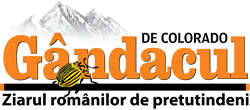RAFA was founded in the summer of 1990 as an immediate result of the revolutionary upheaval in Romania in December 1989. Several dozen Romanians gathered at the Capitol in Denver on December 30, 1989, to demonstrate in support of the revolution and to mourn all those who had been killed during the Communist dictatorship.
With the opening of the borders and the newly found freedoms, the Romanians from Colorado were eager to help at last the battered native country.
On a snowy February day Dana Gall, Irina Frangopol and Ingrid Fotino met at Dr. Iulia Gorelik’s home to discuss starting a charitable organization. A series of meetings at the various churches and one restaurant in the Boulder-Denver area followed the organization to be named the Romanian American Freedom Alliance. In the fall of 1990 they were ready to start officially as an incorporated organization with a budget of î1,000 due mainly to the effort of Magda Blagaila who organized a bake sale and inspired one of the largest groups of Romanians assembled at church to make very generous donations.
The first donations were in the form of food collected from grocery stores and clothes (about 10,000 lbs when packed) and transported (free) by the newly formed Freedom Lift, an independent American initiative. However, most of their assistance over the past twelve years has been in the form of money (about î1,000 a year) which RAFA members took personally to the reciepients. The recepients were families in deep financial difficulty because of death of a parent, severe illness, fire, handicaps, old age, children in orphanages. A notable exception: in 1993 RAFA brought a teenage amputee, Dan Statescu, for medical care in Colorado where he was fit with a prosthesis, all free of charge, thanks to a most generous group of doctors led by Dr. Bertram Goldberg.
At first the funds for this sort of assistance came from membership dues (î15 per family from about 20-30 families) and from donations at picnics on Flagstaff Mountain and other parks. These picnics have now been replaced by the major annual fundraiser, the Romanian Festival on the Pearl Street Mall, started in 1994. In addition to fundraising, the Festival serves the purpose of making the Romanian culture known in the form of food, dances, folkart and books about the national heritage and treasures. It is a joyful event that allows the Romanians to express themselves as a rich culture, crimped no more by the amputating separation that existed when travel out of Romania was almost inexistent and communication was severely limited.
With the opening of the borders and the newly found freedoms, the Romanians from Colorado were eager to help at last the battered native country.
On a snowy February day Dana Gall, Irina Frangopol and Ingrid Fotino met at Dr. Iulia Gorelik’s home to discuss starting a charitable organization. A series of meetings at the various churches and one restaurant in the Boulder-Denver area followed the organization to be named the Romanian American Freedom Alliance. In the fall of 1990 they were ready to start officially as an incorporated organization with a budget of î1,000 due mainly to the effort of Magda Blagaila who organized a bake sale and inspired one of the largest groups of Romanians assembled at church to make very generous donations.
The first donations were in the form of food collected from grocery stores and clothes (about 10,000 lbs when packed) and transported (free) by the newly formed Freedom Lift, an independent American initiative. However, most of their assistance over the past twelve years has been in the form of money (about î1,000 a year) which RAFA members took personally to the reciepients. The recepients were families in deep financial difficulty because of death of a parent, severe illness, fire, handicaps, old age, children in orphanages. A notable exception: in 1993 RAFA brought a teenage amputee, Dan Statescu, for medical care in Colorado where he was fit with a prosthesis, all free of charge, thanks to a most generous group of doctors led by Dr. Bertram Goldberg.
At first the funds for this sort of assistance came from membership dues (î15 per family from about 20-30 families) and from donations at picnics on Flagstaff Mountain and other parks. These picnics have now been replaced by the major annual fundraiser, the Romanian Festival on the Pearl Street Mall, started in 1994. In addition to fundraising, the Festival serves the purpose of making the Romanian culture known in the form of food, dances, folkart and books about the national heritage and treasures. It is a joyful event that allows the Romanians to express themselves as a rich culture, crimped no more by the amputating separation that existed when travel out of Romania was almost inexistent and communication was severely limited.












































